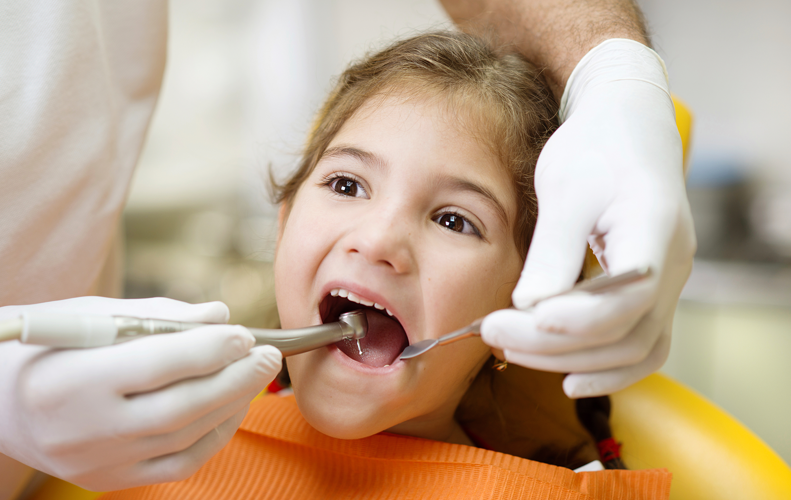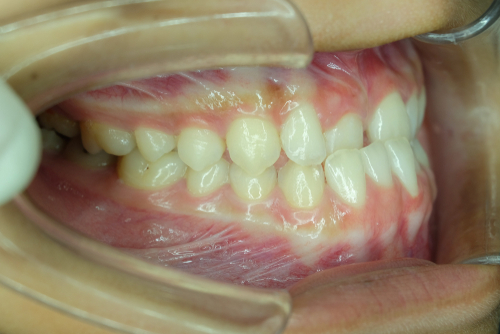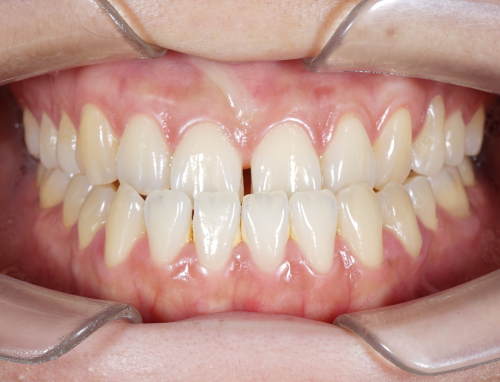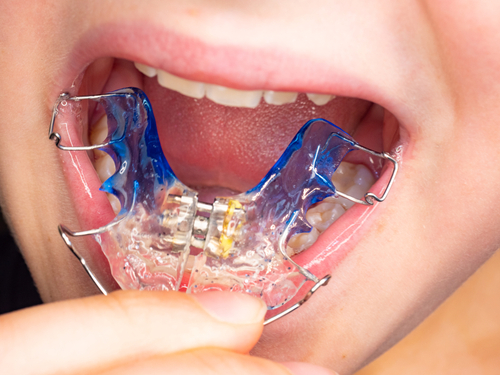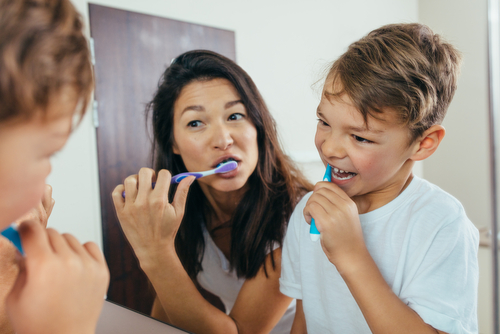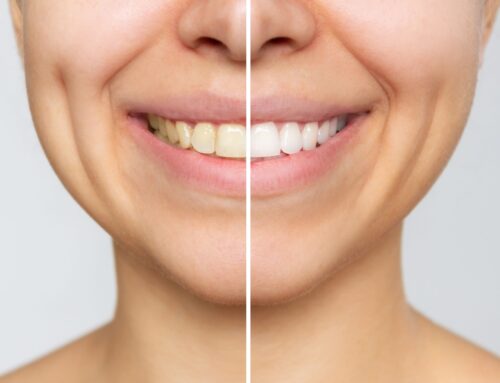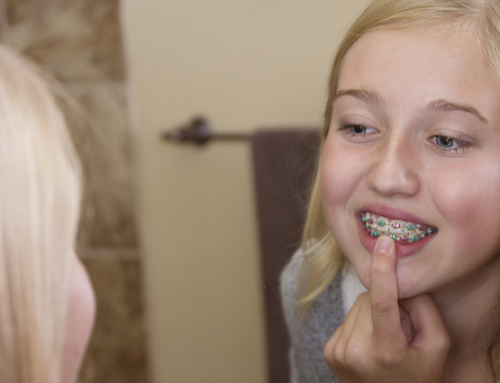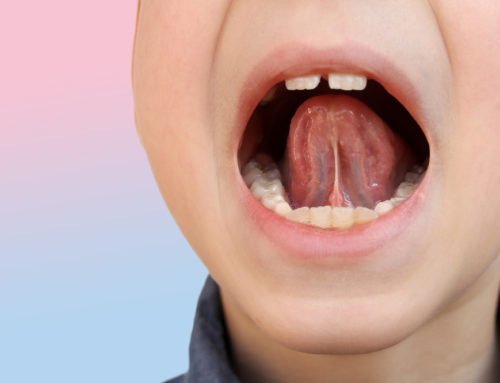Pediatric Crossbite Correction | Braces, Retainers, Fluoride, and More!
While you probably know the definition or could identify an overbite, have you ever heard of a crossbite? If not, Snodgrass King to your child’s rescue! Let us bring this issue to your attention.
A crossbite is when the top and bottom rows of teeth are misaligned in the jaw. We’ll help you identify whether or not your child needs pediatric crossbite correction to fix the issue.
Get To Know Your Crossbite
Crossbites are a type of malocclusion, which is a fancy way of saying that one or more teeth did not come in right. They tend to affect the front teeth and can make it difficult to chew on one side. They can also be caused by a misalignment of the teeth and jaws.
There are two types of crossbites:
1. Anterior Crossbite
Anterior crossbite is a common dental condition. The upper front teeth overlap the lower front teeth, causing difficulty in chewing and appearance issues (like a smile that looks crooked). This can occur on both the front and side teeth.
Anterior crossbites can be caused by a number of factors, including genetic disposition, early loss of baby teeth, thumb sucking, or crowding of the teeth. Anterior crossbites can cause a number of problems, including tooth misalignment, difficulty chewing, and TMJ disorders. Anterior crossbite treatment in a child typically involves wearing a retainer or braces to correct the position of the teeth. In severe cases, surgery may be necessary to correct the alignment of the jaw.
2. Posterior Crossbite
The posterior crossbite is when the upper back teeth are inside. This can cause problems because they can get stuck on your lower teeth or make it hard to chew certain foods.
Crossbites can affect one tooth or several. They can also be found on either or both sides of the mouth. While they are often genetic, there are several general reasons why they are discovered in pediatric dentistry.
- Smaller upper jaw than the lower jaw
- Delayed loss of baby teeth
- Frequent mouth breathing
- Long-term pacifier use
- Excessive finger/thumb sucking
Crossbites are a common problem for children. Don’t think your child needs pediatric crossbite correction? Brace yourself! Crossbites can lead to dental problems, oral issues, and other complications such as significant tooth and gum wear, improper jaw growth, jaw pain, and altered or poor mouth function.
This means both dental and skeletal problems in your child’s future. Dentists across the board agree that crossbites cannot be left untreated.
Crossbites Need to Be Treated By a Pediatric Dentist
- Crossbites are a common cause of jaw growth problems in growing kids and teens.
- Crossbites, or overcrowding of the upper teeth in relation to the lower set of teeth, are linked to an often narrow jaw, which causes bite and respiratory difficulties.
- Kids who start treatment early have fewer problems later on
- When your front teeth collide, they can cause tooth chipping or gum problems. If you notice any of this happening to your child’s mouth, it is imperative that they visit a dentist as soon as possible for treatment.
How To Fix A Crossbite In A Child
After checking the severity of your child’s crossbite, visit a dentist to get professional guidance on how best to correct it. There are many different treatment options that can be used depending on what type you have and where in the mouth it is located.
Kids who have milder cases of crossbite can also use orthodontic treatments, including:
- braces
- retainers
- removable palate expanders
Why Might Tooth Removal Be Needed?
In some cases, the dentist or orthodontist may suggest removing one or more teeth as part of crossbite correction. Tooth removal is typically considered when the mouth is too crowded, making it difficult to realign teeth into their ideal positions. By creating additional space, it becomes easier to guide the remaining teeth into proper alignment with braces or other orthodontic appliances.
While it may sound a bit daunting, this step is only recommended when absolutely necessary—and it can significantly improve the outcome of your child’s treatment. Your dental team will always discuss all available options and explain why tooth removal might be the best approach for your child’s specific needs.
Our pediatric dentists can assess the severity of your child’s crossbite and determine the proper method of crossbite correction. In many milder cases, an appliance (such as a rapid palatal expander or RPE) is fixed along the top teeth and slowly widened over a period of weeks in order to “spread” open the mouth.
The RPE then remains in your child’s mouth for three to five months as a retainer. This allows the jaw to realign as well as sets the palate in place. Thankfully, this process is relatively quick and generally painless. We want pain-free and great results for your children.
Oral Hygiene Challenges With Braces
Maintaining great oral hygiene during orthodontic treatment can be a bit tricky—especially when braces are in the mix. Those brackets and wires love to trap bits of food, making it tougher to keep tooth surfaces clean. Kids (and let’s be honest, parents too) may find brushing and flossing a bit more of an ordeal, but it’s important to stick with it to help prevent cavities and gum issues.
Our hygienists have a few helpful tips for families facing this hurdle:
- Use special orthodontic toothbrushes or electric brushes to get around brackets.
- Floss threaders or orthodontic floss make it easier to clean between teeth.
- Rinsing with a fluoride mouthwash can help reach those awkward spots braces tend to hide.
Keeping up with these habits can keep teeth healthy—and give your child the best possible results from their orthodontic journey.
Headgear as a Crossbite Solution
Another option your dentist may recommend—especially for growing kids—is orthodontic headgear. This device works outside the mouth, connecting to braces or bands and gently guiding the jaw and teeth into the right position. The steady, gentle pressure helps correct jaw alignment and can encourage proper growth in children and teens, whose bones are still developing.
Headgear is usually worn for a set number of hours each day (often in the evenings or overnight), making it effective without being too disruptive to school or playtime. While its appearance can take some getting used to, headgear is a powerful tool for steering jaw and dental development, setting your child up for a healthier, straighter smile.
How To Fix a Crossbite Without Braces
Braces are a perfectly good option to correct the placement of teeth. Having said that, many kids (especially teenagers), find the thought of braces horrifying. Traditional metal braces can be a bit obtrusive-looking. Fortunately, there is a commonly used alternative.
In case you’ve never heard of them, aligners are a semi-recent development in the field of dentistry. They’re essentially a clear orthodontic device that’s been molded to fit your teeth and gently re-align them. Similarly to braces, the role of aligners is also to move teeth into their correct position.
Unlike braces, however, aligners are clear and unobtrusive-looking. This makes them a much more aesthetically pleasing option. Additionally, aligners can actually be removed for short periods of time. Although you still want to wear them for most of the day, they can be removed for short activities such as eating and brushing.
All of these benefits have made aligners more and more popular in recent years. Do keep in mind, however, that they are a little pricier than traditional braces. Always ask your dentist about your orthodontic options. They can consider your budget and dental needs and provide you with a recommendation.
How Long Does it Take to Fix a Crossbite?
Crossbite treatment can be a long process. It will usually take anywhere from 18 months to 3 years, depending on the severity of your child’s crossbite!
Because crossbite correction can be relatively easy with a little time and attention, early pediatric dental care can significantly eliminate harmful side effects and future problems. Why not fix it now? It’s important to work with a dentist early on so that your child can get braces later on before it is permanent.
Is your child chomping at the bit? Let us at Snodgrass King aid in your child’s oral care through pediatric dentistry.
At What Age Should A Crossbite Be Corrected?
To start with, know that the American Association of Orthodontists recommends that “all children be screened by an AAO orthodontist at age 7”. It can be tempting to put off visiting the orthodontist, but please know that it’s always better to be ahead of the curve.
Braces themselves are most often applied once a child’s adult teeth have come in. This might be around age 12-14. Braces work by straightening the upper and lower teeth, helping to align the bite in the correct position. Both children and adults can benefit from braces when seeking to correct alignment issues. Having said that, braces alone often can’t fix a crossbite. Before even putting in the braces, your child will often require a palate expander.
Unlike braces, a palate expander is used to widen the jaw itself, not the teeth. Due to this, it’s actually better to begin younger (think age 7 or 8). In these early stages, your child’s jaw is still forming, and therefore easier to shape. That is why it’s best for your child to have their first orthodontist visit while they are still young.
Crossbites In Toddlers
As mentioned above, crossbite treatment often begins around age 6. This means that even by age 3, you, as a parent, should begin to keep an eye out for signs of discomfort in your child’s mouth or jaw. Believe it or not, crossbites are often genetic. Due to this, children can begin developing one at a very young age. This is why it’s so important that you bring in your child for their first dental checkup by age 1, and continue regular visits to your pediatric dentist.
Can Baby Teeth Have Crossbites?
Yes, many orthodontists recommend beginning treatment with a palate expander while the child still has a mix of baby teeth and adult teeth.
What Happens If A Crossbite Is Not Corrected?
Generally speaking, a crossbite is a misalignment of the teeth or jaw. This misalignment can cause your jaw to be off-balanced.
If your child develops a crossbite, it must be corrected as soon as possible. Left untreated, the misalignment will cause muscle strain, chewing problems, wearing down of enamel, uneven facial features, and much more. As your child grows up, these issues will only worsen. Eventually, that small case of pediatric crossbite will become an adult orthodontic problem with possible complications.
Another condition called Temporomandibular Joint Dysfunction (TMJ), has also been linked to crossbites. TMJ occurs when the temporomandibular joint moves out of place and can’t open and close smoothly. Unfortunately, a crossbite can affect the way you bite down, which in turn can negatively affect your temporomandibular joint. Don’t forget to consult with your dentist or orthodontist if you’re experiencing jaw pain.
How Can Parents Help?
As a parent, one of your many jobs is to teach proper hygiene to your children, which can, and in many cases should, include early pediatric dental care. I know what some of you may be thinking… braces and retainers and fluoride, oh my! But the truth is that pediatric dentistry can prevent long-term negative oral issues from happening to your child’s pearly whites.
At Snodgrass King Dentistry, we set you up with the tools to succeed in your child’s pediatric dental care. Without pediatric dentistry, you and your child may miss crucial red flags that lead to issues such as crooked teeth, cavities, and uneven jaw development.
To Do
Some things you should implement in your child’s dental routine include regular flossing and brushing his or her teeth, visiting the dentist at least twice yearly, encouraging a balanced diet, as well as drinking water.
To Stop
On the other hand, there are a handful of habits to break if you see your child developing them. Some include prolonged pacifier use, finger/thumb sucking, constant mouth breathing, inconsistent dental care, and excessively drinking sodas or eating sugary foods.
More nervous to visit us than your child is? Don’t be! We are here to listen and help you and your family. Let our pediatric specialists at Snodgrass-King aid in your child’s oral care!
Your child doesn’t have to suffer from a crossbite when there are multiple solutions available. Pediatric dental care is a great way to not only make your children more comfortable but also educate them on oral hygiene.
Prevent Tooth Decay By Visiting Snodgrass-King Family Dentistry in Middle Tennessee
Looking for a new pediatric dentist? We’d be happy to have you here at Snodgrass-King Dental! We offer services for children and adults alike. This means that you can come in for your dental cleaning while your child gets theirs. The best part? You get to know all of your family’s dental providers and establish a long-term relationship with them.
Our practice offers a variety of services; here are a few:
- Dental Sealants
- Fillings
- Crowns
- Tooth Extractions
- Crossbite Correction
- Teeth Whitening
- Implants
- And much more…
For your convenience, our practice offers a handful of offices throughout the Tennessee area. Our offices are located in Franklin, Spring Hill, Murfreesboro, and Mt. Juliet. All of our locations offer top-tier dental services to their communities. We’re proud to be a cornerstone of the Tennessee community, and we couldn’t be happier to serve our patients.
Interested in scheduling your first appointment? Call or fill out our online form today. We’d love to meet you!


